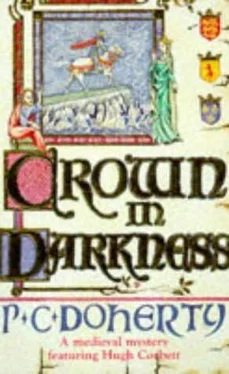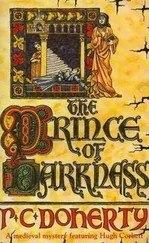Paul Doherty - Crown in Darkness
Здесь есть возможность читать онлайн «Paul Doherty - Crown in Darkness» весь текст электронной книги совершенно бесплатно (целиком полную версию без сокращений). В некоторых случаях можно слушать аудио, скачать через торрент в формате fb2 и присутствует краткое содержание. Жанр: Исторический детектив, на английском языке. Описание произведения, (предисловие) а так же отзывы посетителей доступны на портале библиотеки ЛибКат.
- Название:Crown in Darkness
- Автор:
- Жанр:
- Год:неизвестен
- ISBN:нет данных
- Рейтинг книги:4 / 5. Голосов: 1
-
Избранное:Добавить в избранное
- Отзывы:
-
Ваша оценка:
- 80
- 1
- 2
- 3
- 4
- 5
Crown in Darkness: краткое содержание, описание и аннотация
Предлагаем к чтению аннотацию, описание, краткое содержание или предисловие (зависит от того, что написал сам автор книги «Crown in Darkness»). Если вы не нашли необходимую информацию о книге — напишите в комментариях, мы постараемся отыскать её.
Crown in Darkness — читать онлайн бесплатно полную книгу (весь текст) целиком
Ниже представлен текст книги, разбитый по страницам. Система сохранения места последней прочитанной страницы, позволяет с удобством читать онлайн бесплатно книгу «Crown in Darkness», без необходимости каждый раз заново искать на чём Вы остановились. Поставьте закладку, и сможете в любой момент перейти на страницу, на которой закончили чтение.
Интервал:
Закладка:
Corbett bathed in the guest-house's one and only tub before dressing and going down to the buttery for ale and a bowl of bread and fish boiled in milk. He then went to the library. It was now dusk but the old librarian had the sconce torches lit and gave Corbett what he had requested, a candle and a battered copy of the "Sic et Non', the brilliant satire on scholastic theology by the Parisian scholar, Abelard, who had lost his family as well as his testicles for ridiculing the theologians and then compounding his sin by falling in love with a woman. Corbett loved the brilliant logic delivered so tongue-in-cheek that only those who wished to take offence would be affronted. He read it carefully, the lucid language and poetry of argument clearing and settling his mind. Darkness fell. The librarian, fearful of fire, gently shooed Corbett out so the clerk went down to stroll in the monastery's small herb garden while he rigorously analysed all he had learnt in his journey to Kinghorn. Corbett walked and argued with himself until the bells tolling for Compline brought him into the Abbey church with its lofty roof, pointed arches and round drum-like columns. He went up the nave and into the square chancel where the monks were gathered, seated in benches on each side. The main cantor rose and began the prayer, warning the brothers that Satan roamed the world like a starving lion looking for victims he could devour. Corbett, gently dreaming at the end of a bench, could well believe it and wondered if this time Satan would search him out.
FOUR
Satan did walk Scotland and no more so than in the chambers and corridors of Edinburgh Castle. King Alexander was dead. His body now lay rotting under the cold grey slabs of an abbey, his strong rule was gone and, throughout the castle, nobles gathering for the council plotted and intrigued. Friendships died, new alliances were made and old ones betrayed as the powerful barons, courtiers and important officials scented the power, influence and wealth now available for the throne was empty with no real heir-apparent. Alexander had kept them leashed, curbed and checked, but now the leading nobles were almost drunk with a feeling of power and freedom.
In his own chamber, the Lord Bruce showed these feelings but he was a practical man who simply believed power should be grasped and wielded. He sat, a wine cup clenched firmly in his hands, as he stared through a window into the gathering darkness. The King was dead. Thank God he was, Bruce thought! Adulterer! Lecher! A good warrior but the Bruces had as much claim to Alexander's throne as he had, and now the throne was empty. Bruce stirred and wrapped his cloak firmly about him. There would be confusion, Bruce thought, and out of this a strong ruler would need to emerge. A man fit to rule with an iron hand, to hold down the wild men of the North, the seafarers of the isles and the wealthy Norman barons in the south. Bruce was glad Alexander was dead. He felt guilty at the thoughts which flooded into his mind. He would need to confess them, be shrived, for even to think about the King's death was treason. For a short while, Bruce's mind wondered what measure of guilt he bore, for had he not wished the King's death? Almost danced with joy as the royal corpse was brought back from Kinghorn? He should hide such thoughts for they could well call Alexander back from Hell to exact his vengeance.
In other chambers men, lords and their retainers sat and gossiped about what would happen next. Alexander had left an heir, a weak baby princess, living in the Norwegian court. But was she fit to rule? And who else was there? The Comyns? The Balliols? And, of course, Edward of England. Bishop Wishart, Chancellor of Scodand, also considered these names. He sat at his desk, huddled in his great cloak, oblivious to the cold draughts which came under the door or through the cracks in the wooden shutters on the window. Candles in iron candelabra shed some light but Wishart preferred the darkness, even the cold, so he could think clearly, logically, plan and plot.
Wishart had one great love, Scotland. He did not mind who ruled the kingdom as long as the prince was strong, courageous and ready to defend it against a ring of enemies. Wishart was an educated man. He had travelled over Europe and had witnessed what was happening. The great kings, Philip of France and Edward of England, were building up nation states. Roads were being levelled, armies raised, castles erected, laws passed, justice imposed, while Scodand was still a collection of races. Only an iron clasp, the steel hand of a ruthless king would keep them in check and create peace throughout the country.
Wishart secretly mourned Alexander. He had not liked the man. The dead King had been a lecher who lusted after other men's wives, daughters, sisters, like a dog on heat. Nevertheless, Alexander had been strong. Now he was gone, suddenly and mysteriously. Wishart stirred restlessly. Should he examine that problem? God knows there were many who wanted Alexander dead. The Bruces, the Comyns. The men whose women had been his mistresses. They all had their motives. Wishart narrowed his eyes and looked into the candlelight. There had been rumours, warnings about Alexander's death long before it happened. In this castle, months before the tragedy, there had been a banquet. Alexander was there surrounded by his mistresses and friends, drinking and eating. Wishart had been away but he had heard the stories later, how Alexander had suddenly looked down the hall, dropping his cup and going pale with fright. "What is it my Lord?" courtiers had asked. Alexander shook his head, and, raising his hand, pointed down into the darkness. "I see a man," he replied softly. "A monk. A man in a shroud. Can't you see him?" "No, my Lord," came the reply. Alexander had continued to stare, completely sober now, at the apparition only he could see. "He is warning me about my death," Alexander announced quietly, "Violent and soon to happen!" The alleged vision had spoiled the banquet, depressed the King for weeks afterwards, before his natural good-humour and boisterous spirits dismissed it as a phantasm of too much drink.
Wishart bit his lip. He did not trust in visions. He did not believe God had the time to interfere in the petty affairs of men. Was it some trick of the light? Or had someone planted the idea in Alexander's mind? There were other mysterious happenings. The prophecies of Thomas the Rhymer, or Thomas of Learmouth, the self-proclaimed seer, who claimed he had dreams of Alexander's death, constantly warning the King of this in four-line doggerel verse. Wishart grunted. One day his inquisitors would take Master Learmouth and put him to the question. Was he a prophet? Or a man who meddled in the black arts? Whatever, his prophecies about Alexander's death had been proven brutally correct.
Wishart felt as if he was standing at a crossroads with two paths leading into the darkness. On the left, the problem of solving the King's death, of finding the murderer. On the right, the even more pressing problem of who was to succeed Alexander. The barons had sworn to uphold the cause of his granddaughter in Norway, but could a three-year-old girl rule Scotland? Or would it be someone else? Perhaps if he followed one path, he would find a place where they came together? Perhaps Alexander was not murdered, perhaps it was an accident. Perhaps the result of jealousy, some man sickened and tired of the king seducing or pursuing a woman. Yet, there could be other reasons. Did one of the claimants to the throne arrange the murder?
Wishart had considered Edward of England but then dismissed him. Edward was in France. There was no sign of his meddling in Scottish affairs, apart from sending his envoy, Benstede, and that inquisitive clerk, Corbett, across the border. Benstede had been there before Alexander died and Corbett, so Wishart's spies told him, was not sent by the King but the Chancellor of England, that wily old fox, Robert Burnell. Wishart had Corbett watched carefully but all the, reports indicated that Corbett had not been officially despatched by Edward. Wishart quietly wondered what was happening in the English court. Perhaps there was a division? Nevertheless, the bishop was firmly assured that, as yet, the English posed no threat.
Читать дальшеИнтервал:
Закладка:
Похожие книги на «Crown in Darkness»
Представляем Вашему вниманию похожие книги на «Crown in Darkness» списком для выбора. Мы отобрали схожую по названию и смыслу литературу в надежде предоставить читателям больше вариантов отыскать новые, интересные, ещё непрочитанные произведения.
Обсуждение, отзывы о книге «Crown in Darkness» и просто собственные мнения читателей. Оставьте ваши комментарии, напишите, что Вы думаете о произведении, его смысле или главных героях. Укажите что конкретно понравилось, а что нет, и почему Вы так считаете.












